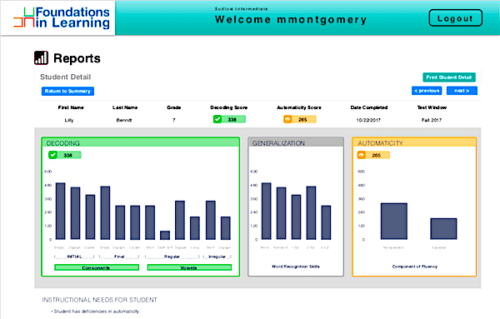 Foundations in Learning (FIL) today announced the release of the Iowa Assessment of Skills and Knowledge (iASK)—a new diagnostic and screening tool used to identify specific areas of need for struggling readers in middle school. iASK addresses an urgent need for this currently underserved group of students. According to the National Assessment of Education Procurement (NAEP), two thirds of U.S. middle school students are not proficient readers. Half of those students do not have automatic word recognition skills, which are essential for reading fluency and comprehension. Developed specifically for the middle school market, iASK is a validated and reliable online assessment that represents the culmination of four years of research and development.
Foundations in Learning (FIL) today announced the release of the Iowa Assessment of Skills and Knowledge (iASK)—a new diagnostic and screening tool used to identify specific areas of need for struggling readers in middle school. iASK addresses an urgent need for this currently underserved group of students. According to the National Assessment of Education Procurement (NAEP), two thirds of U.S. middle school students are not proficient readers. Half of those students do not have automatic word recognition skills, which are essential for reading fluency and comprehension. Developed specifically for the middle school market, iASK is a validated and reliable online assessment that represents the culmination of four years of research and development.
Using a digital platform, iASK replaces labor-intensive tests and provides teachers with unique tools to make critical decisions about appropriate intervention. iASK goes beyond currently available assessments by identifying a profile of specific deficits in foundational reading skills and by incorporating a new and critical measure of automaticity, a precursor of fluency. It includes new composite measures that not only identify specific needs, but further indicate whether students can efficiently and automatically use what they know. It is the newest product developed by Foundations in Learning, the Iowa-based educational technology company founded by academics and research scientists, Dr. Carolyn Brown and Dr. Jerry Zimmermann.
“We recognized that middle school educators were in desperate need of an efficient way to differentially diagnose students’ reading difficulties as the first step toward implementing an appropriate intervention,” said Dr. Carolyn Brown, President of Foundations in Learning. “To that end, we collaborated with our colleagues at the University of Iowa to scientifically develop and validate iASK to help both students and teachers address the critical issue of reading failure in so many adolescents.”

The research and development that resulted in the launch of iASK took place over a four-year period in collaboration with researchers and scientists from the University of Iowa—Drs. Bob McMurray and Eliot Hazeltine, professors and cognitive scientists in the Department of Psychological and Brain Sciences and Dr. Deborah Reed, Director of the Iowa Reading Research Center (IRRC) and a professor in the College of Education. The research was supported by two rounds of funding from the Small Business Innovation Research (SBIR) program at the U.S. Department of Education’s Institute of Education Sciences (contract ED-IES-15-C-0023). In 2014, FIL received a $150,000 phase I award followed by a $900,000 phase II grant in 2015 to support full product development and two waves of validity and reliability testing. The State of Iowa, through the IEDA program, also supported FIL’s research and development efforts to improve foundational reading skills for struggling students.
“It is very rewarding to see the real-life impact of bringing the science of learning to practice in the classroom. iASK has important implications for focusing on how students learn in addition to what they learn. It not only fulfills the mission of the University of Iowa to advance scholarly endeavors through leading-edge research, this tool will make a significant difference in the lives of students in the state of Iowa and around the country,” said Dr. McMurray.
“This diagnostic is a powerful new tool that arms teachers with an individual profile of foundational knowledge and skills for struggling students. This information is essential to breaking through the barriers that prevent so many students from achieving academic and economic success,” said Dr. Reed.
iASK can be implemented as a stand-alone diagnostic and screener or as part of an integrated system provided by FIL. iASK has been seamlessly integrated into FIL’s premier intervention product, Access Code.
“Together, these tools provide teachers with an efficient and effective way to accurately assess struggling readers, provide personalized instruction, and importantly, measure its impact. Only when students make significant gains in these basic gateway skills will they have access to the all-important task of reading for comprehension,” said Dr. Jerry Zimmermann, VP of Research for FIL.
Much of the research used to develop and refine iASK was conducted in partnership with the Cedar Rapids Community School District in Cedar Rapids, Iowa, over a three-year period.
“We are delighted that middle school students across our district were able to participate in the research that led to the development of the iASK screener and diagnostic tool,” said Dr. Carlos Grant, Executive Director of Personalized Learning and Middle Level Education, for the Cedar Rapids Community School District. “Through this process, we were able to identify which of our students needed basic skill intervention and then target those skills they needed to develop. We’re thrilled to have these insights and be able to deliver specific, targeted intervention, as a result.”
Practical Benefits for Students and Teachers
iASK features two key components: a 20-minute online screener that quickly distinguishes which students lack foundational reading skills, and a 60-70 minute online diagnostic that can be administered over several sessions. Implemented seamlessly in today’s wired classrooms, iASK offers teachers and students the following benefits:
- Saves considerable time by accurately evaluating students through one assessment tool versus several separate, time-consuming and labor-intensive assessments.
- Generates a detailed profile for each struggling reader.
- Provides a level of specificity in the differentiation of foundational reading needs not offered by any other tool.
- Identifies specific gaps in decoding skills as well as deficiencies in generalization and automaticity of word recognition, which are essential to developing reading fluency and comprehension.
- Assesses students on all classes of sound-symbol mappings such as short vowels, long vowels, consonant blends/digraphs, vowel digraphs, diphthongs and r-controlled vowels.
- Groups students with similar needs.
- Allows teachers to track student progress at regular intervals and further personalize intervention.
Students who are identified as needing further intervention can then be automatically enrolled in Access Code, an instructional tool to prepare students for reading fluency and comprehension by ensuring they have the prerequisite skills in place. Based on research and rooted in learning theory, Access Code provides a personalized learning experience and allows students to work at their own pace. Students use Access Code 15-20 minutes per day and typically complete the curriculum in approximately six to nine months. Versions are available for both elementary and secondary school and support several blended curriculum models of implementation. To find out more information about iASK and Access Code, and to request a demo, visit foundationsinlearning.com.
About Foundations in Learning
Foundations in Learning (FIL) provides school districts with highly effective, research-based tools designed to assess struggling readers, address their foundational skill deficits and empower them to achieve significant gains in reading fluency and comprehension. Together, FIL’s integrated assessment and personalized instruction solution, Access Code, offers a targeted intervention to prepare all students to engage in reading comprehension. For more information, visit foundationsinlearning.com





